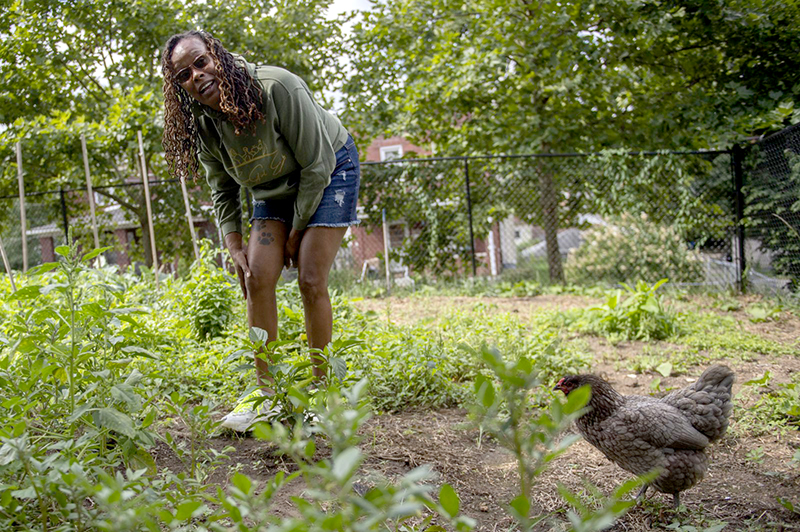

Story by JULIA BURDELSKI
Photos by MASSOUD HOSSAINI
Tribune-Review
Sept. 29, 2024
Ebony Lunsford-Evans would like nothing more than to spend all day tending her crops and chickens.
“I spend a lot of my time out here,” the woman known to some as Farmer Girl Eb said on a recent August morning, gesturing at the farm she runs in Pittsburgh’s Sheraden neighborhood. “This is where my freedom is. I love to be in the dirt.”
At 45, Lunsford-Evans, is part of an urban farm army, one of a growing number of city dwellers who are getting back to nature and working the land in the steel and concrete jungle.
Throughout Pittsburgh, community gardens and farm plots have sprouted. They’re nestled among the rowhouses and streets of city neighborhoods, including those that are better known for guns and drugs than trowels and compost.
These are not subsistence farmers or hobbyists. Rather they are food crusaders with lofty goals: to bring fresh, healthy produce to their inner-city neighbors and teach others the secrets of a green thumb.
In marginalized communities where fresh food is scarce, urban farms are sometimes the only way to expose people to leafy greens and other healthy produce.
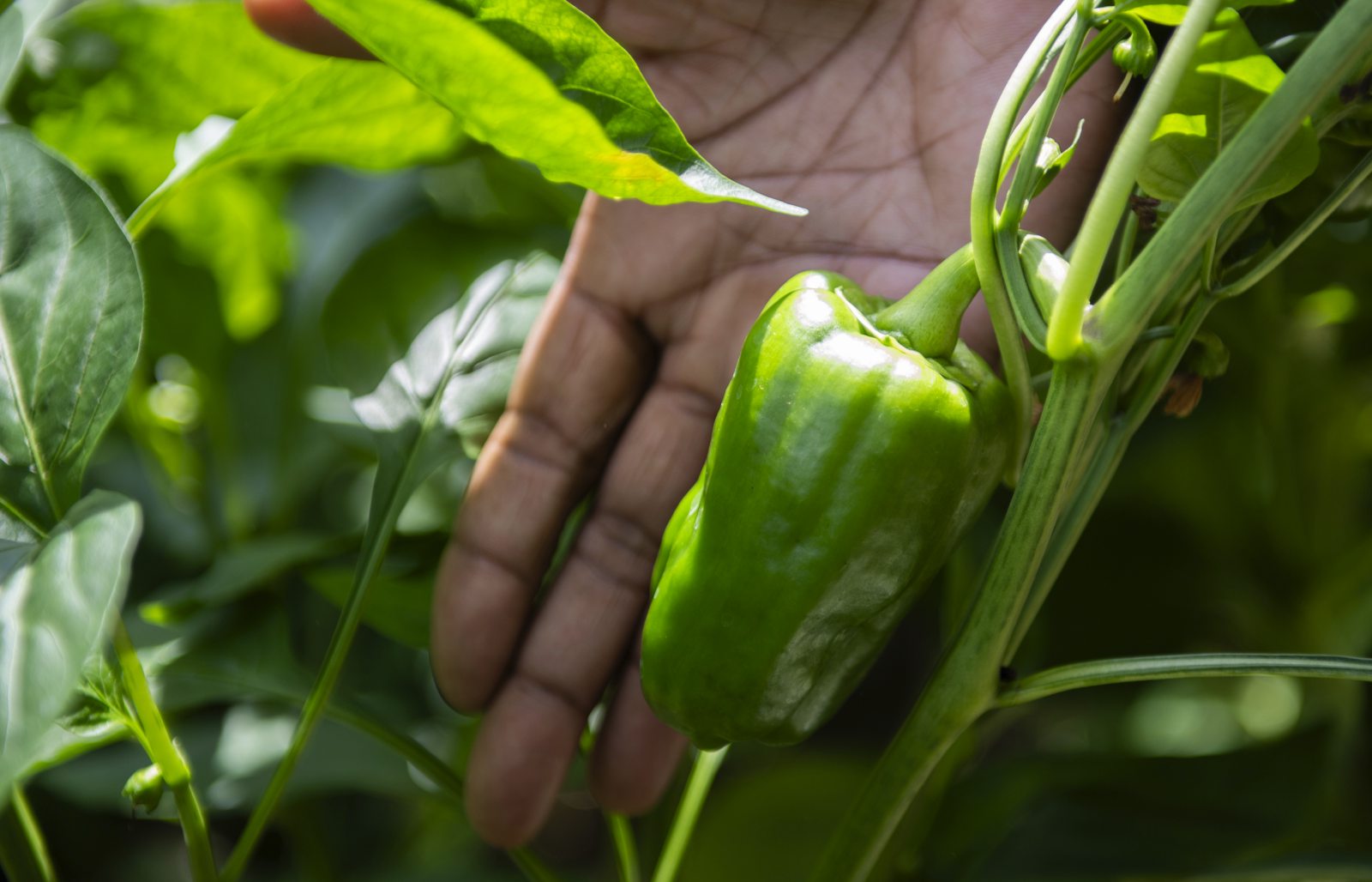
Sheraden is a perfect example. It lacks a grocery store, and residents who don’t have easy access to cars often struggle to find a place to buy fresh food.
“You have hardworking people around here who can’t come home and get a fresh tomato,” Lunsford-Evans said. “That’s wrong.”
Growing up in Pittsburgh’s densely populated Northview Heights, Lunsford-Evans said she knew little about fresh food. She didn’t even know what a Brussels sprout looked like until she was 18, when a friend pointed them out at a grocery store.
“There were so many vegetables I couldn’t even identify,” Lunsford-Evans said. “I’d never tasted them. So many people are in that same situation to this day.”
She started gardening in her backyard in Sheraden in 2017. Neighborhood kids soon flocked to her plot. The former teacher showed them how to grow food and care for plants. Soon, she said, it turned into an outdoor classroom and community gathering space. Lunsford-Evans realized she had found her passion.
Four years ago, she moved her operations a few blocks from her home to two lots at the corner of Universal and Fairdale streets. It’s a green oasis amid tightly packed houses, cracked cement sidewalks and a cobblestoned street lined with cars.
The Sheraden site is one of two she farms — the other is on the city’s North Side — to grow food to give to neighbors and to stock her nearby corner store.
In Sheraden, Lunsford-Evans packs essentials into a small space. She grows sweet potatoes, red potatoes, white potatoes, a variety of bell peppers, basil, tomatoes, pumpkins, oregano, mint, zucchini, cucumbers, squash and Easter Egger chickens that lay pastel-colored eggs.
Last year, by her count, the tiny lot produced about 5,000 pounds of food. Lunsford-Evans takes some of it to her store, Farmer Girl Eb, on Noblestown Road in Elliott and donates some to organizations throughout the city. Sometimes, she leaves extra produce on neighbors’ doorsteps.
Moe Moe, 22, lives around the corner from the store. He and his family often stop by to pick up vegetables and other staples.
“Within the area, there’s no other grocery stores around,” Moe said. “We have to travel. Some people don’t have vehicles. They have to get on buses to get groceries.”
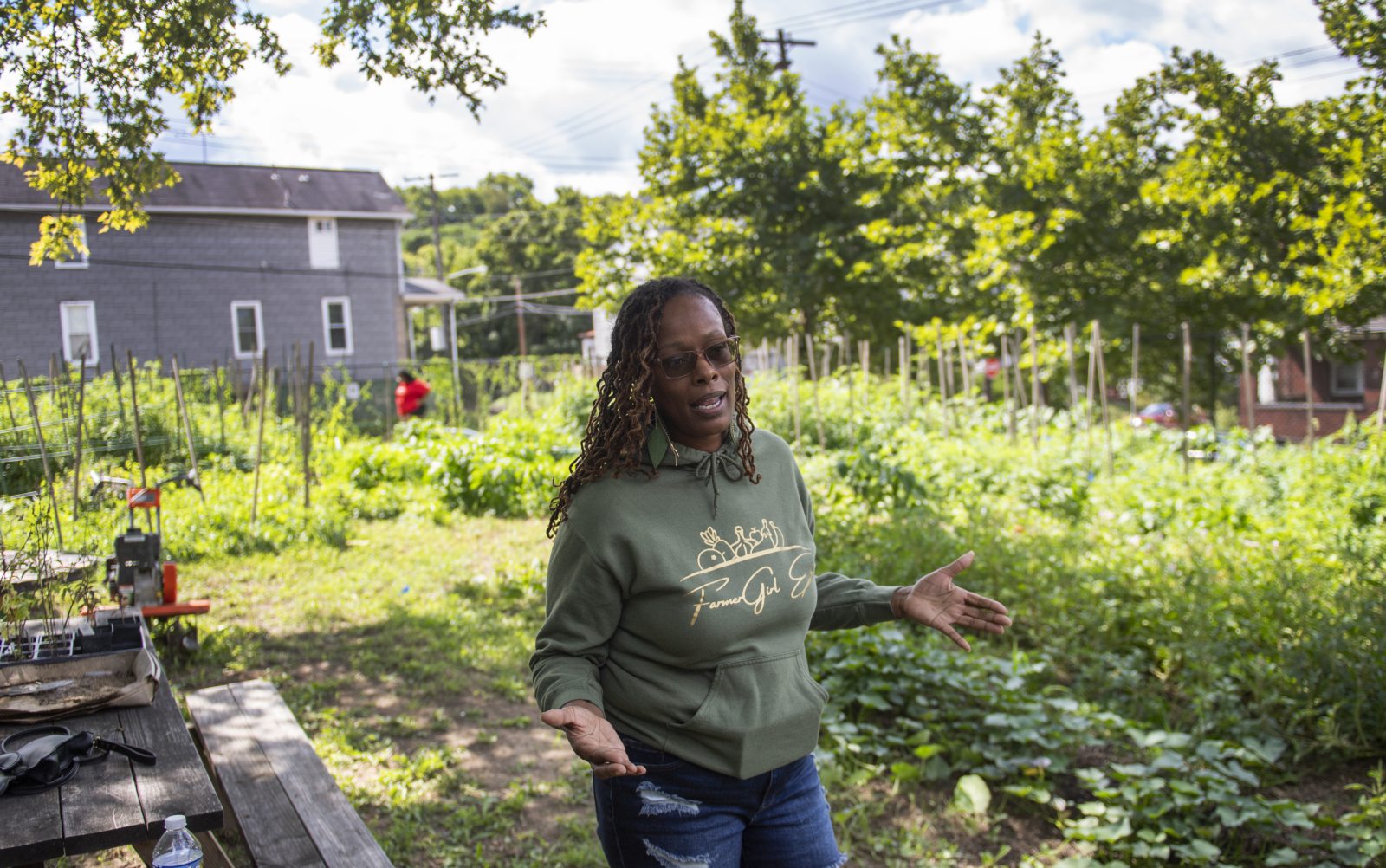
Lunsford-Evans teaches local kids and adults about how their food is grown, what it takes to start a small garden and what kinds of nutrients different produce can provide.
Her three chickens — including a friendly hen named Patrice who clucks at visitors and follows Lunsford-Evans around the farm — are a teaching opportunity.
Some kids, Lunsford-Evans said, have been surprised to learn the eggs they eat come from somewhere other than a grocery store.
“I had no idea I would be an educational resource for so many people, younger than me, older than me, Black, white, male and female,” she said. “It feels so good to see that light bulb go off over their head.”
Lunsford-Evans said she hopes to inspire others and help people grow their own gardens or farms. Everyone should have access to quality food, she said, and no one should feel like farming isn’t for them.
“Right now, I’m the only Black urban farmer in this city that has two urban farms and a fresh food corner store,” she said. “I shouldn’t be the only one.”

Raqueeb Bey founded the Black Urban Gardeners and Farmers of Pittsburgh Cooperative with similar goals. The co-op aims to expand fresh food access and support Black Pittsburghers who want to grow food.
The coalition manages the small Homewood Historical Farm, in the city’s Homewood neighborhood, where food access is scarce.
Some people call places like that food deserts. But Bey calls it “food apartheid” because she blames systemic shortcomings and racism for hampering food access in primarily poor and minority neighborhoods.
Bey and others have come together to share knowledge and resources among the city’s Black farmers. The co-op has more than a dozen members, Bey said, who encourage people to try growing food for themselves.
Amir Rashidd, 81, of the Hill District, serves as the Homewood farm’s manager.
“I’ve been farming since I was about 7 years old,” Rashidd said. “It’s in my blood.”
Leaning on a walking stick one day last month, he plucked green bell peppers and ripe red tomatoes from their raised beds while explaining how the food would be harvested to be sold at farmers markets and given to neighbors.
Often, he said, he leaves bags of fresh produce hanging on the aluminum fence around the farm so people can take what they need.
“The majority of it is given away,” he said. “And the groundhogs get their fair share.”
Rashidd grows collard greens, cabbage, spinach, peppers and tomatoes with the help of about 15 volunteers.
Growing food, he said, runs in the family. When he was a child, he helped his grandmother turn the soil over in the garden she maintained.
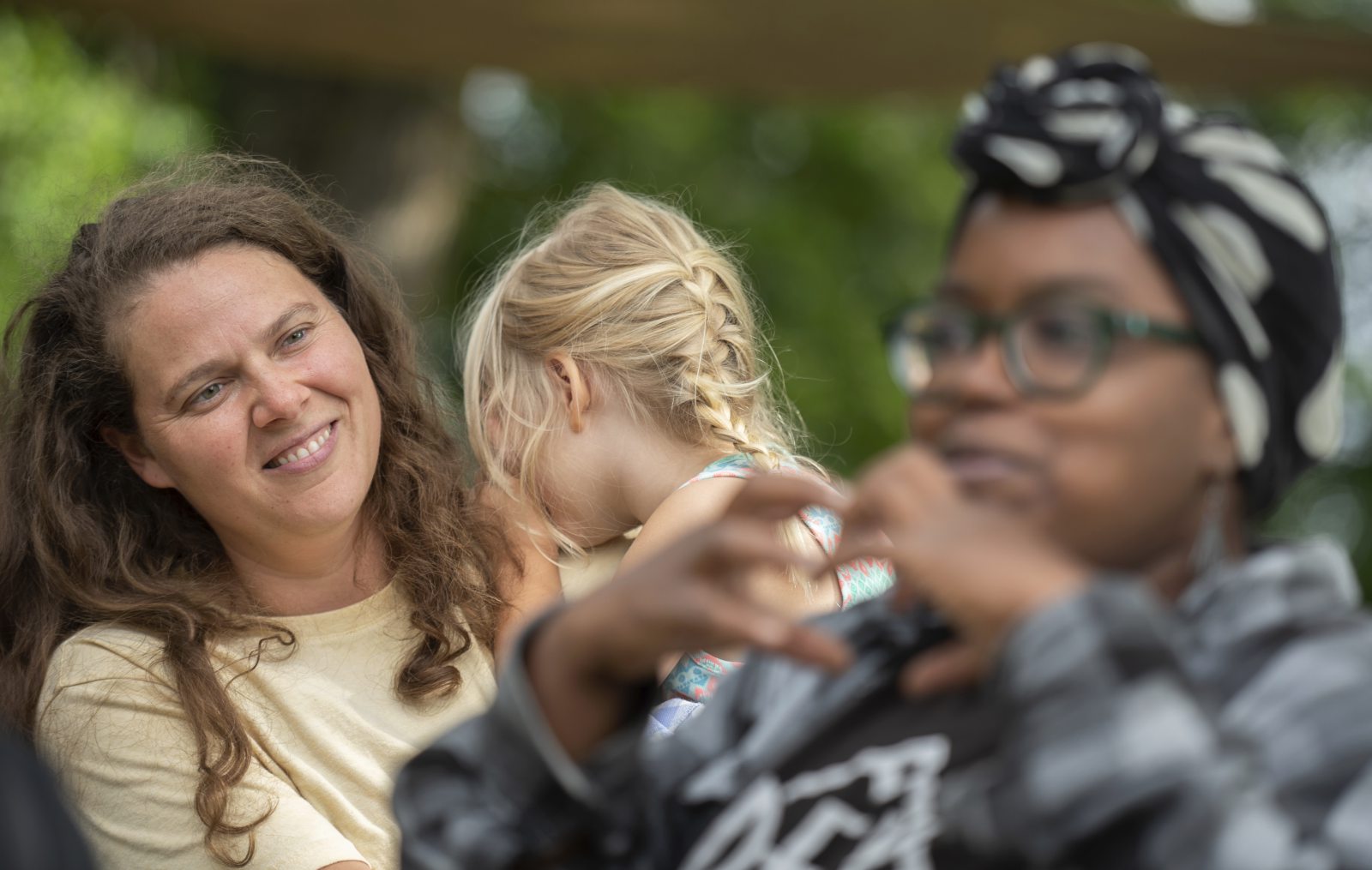
Pittsburgh’s Garfield neighborhood has no grocery stores, so Garfield Community Farm does what it can to help.
“You’re filling in the gaps,” said AJ Monsma, director of community engagement.
Most of its food is donated to community organizations and churches. Some is sold through a mobile market, which also gives away food to anyone who can’t pay. Nearly all the farm’s output stays within the East End, Monsma said.
The farm also serves as a place for community gatherings and a safe space for local kids. Colorful artwork adorns its fences, children’s books fill a little free library, and an herb labyrinth sometimes hosts community vigils in the wake of violence — a reminder of the urban ills surrounding the slice of country in the city.
“We’re in a community where there’s a lot of trauma,” said Monsma, who lives a few blocks away. “As an urban farm in Garfield, we realize we need to have a focus on mental and behavioral health because of where we are.”
Recent additions include several sensory spaces where people can touch smooth rocks, smell fragrant herbs, listen to the chirping birds and connect with nature. Volunteers make use of every nook and cranny, where bean vines climb wire fences, barrels capture rainwater and food waste is composted for fertilizer.
The farm has a bio-shelter where they store seedlings and grow some food year round, like okra, kale, green beans, passion fruit and pomegranates. There’s a chicken coop, and flowers attract more than 400 species of bees.
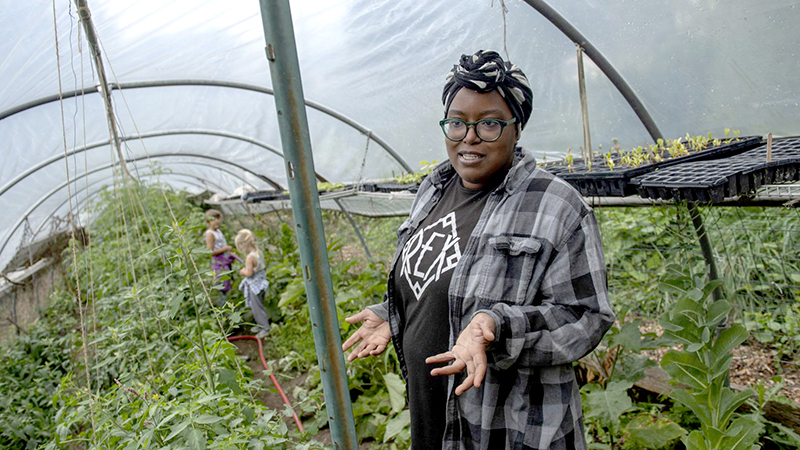
Built on a hillside under the shadow of an enormous blue water tower, the farm was previously owned by a local church. The soil wasn’t great for planting, Monsma said, and the terrain proved trickier to farm than flatter sites.
“No sane farmer would’ve chosen this land to start a farm,” Monsma said, gesturing to the sloped plot where houses once sat. “There was no healthy soil whatsoever.”
But workers choose to leverage those challenges into an opportunity to demonstrate that anyone can grow food anywhere. Now, in addition to garden staples, the soil produces a rich variety of foods — 3,000 pounds in all. The diverse crops include elderberries, ground cherries, hazelnuts, serviceberries, banana peppers, sweet potatoes and pawpaws.
“It shows people you can grow with what you have,” said Mahagony Thaxton, the farm’s production and distribution assistant. “Our work in Garfield is a highlight of looking at a community’s assets, not their deficits.”
It’s also a way of creating a melting pot.
“The space really is the best reflection of Garfield community members,” Thaxton said, pointing out one bed that a father-and-daughter team tend and another where a longtime resident has been growing produce for years. “It is an intersection of older Garfield residents, younger residents, more well-off and more working-class residents across race, age, gender.”
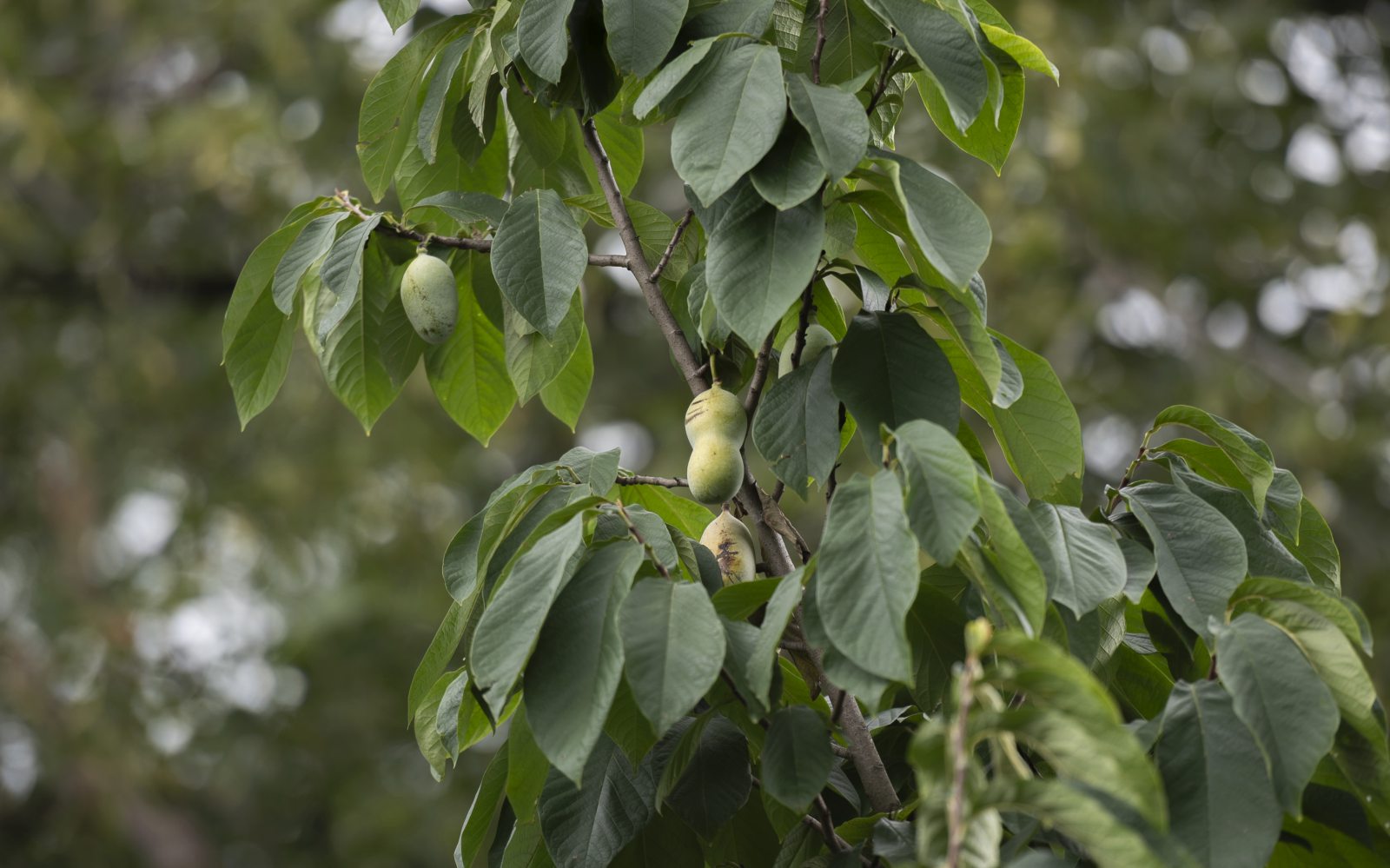
The dearth of food access in many Pittsburgh communities is a problem city leaders are looking to help local farmers solve.
Pittsburgh’s City Farms division aids farmers and gardeners, providing soil testing, fencing and other resources. It’s helped more than 20 urban gardens so far this year.
Pittsburgh budgeted $25,000 to support local farms and gardens this year. The city also launched a $3 million food justice fund, which can support local growers and other efforts to support food access.
Councilwoman Deb Gross, D-Highland Park, has spearheaded an effort to plant more than 200 food-bearing trees, mostly on public property, throughout communities she represents. The effort kicked off during the covid-19 pandemic.
All of the trees are native to Pennsylvania, she said, like black elderberries, juneberries, hazelnuts and pawpaws.
Elderberries also started sprouting this summer from trees planted at Belasco Orchard in the Beechview neighborhood. It marked the city’s first foray into food-producing trees there. The orchard has 27 trees now, but Councilman Anthony Coghill, D-Beechview, hopes to grow it to 100.
People can take food from the trees for free. The goal is to grow the program enough that the food produced can be donated to food banks.
Pittsburgh isn’t the only city that’s embracing community-grown food.
“I think there’s been a food revolution going on for quite a while,” said Mchezaji “Che” Axum, director of the Center of Urban Agriculture and Gardening Education at the University of the District of Columbia.
Nationwide, he said, there’s been increased interest in growing local food over the last decade or so. That interest soared during the covid-19 pandemic, he said, when food insecurity became especially tough in some communities.
“I know that surely led a lot of people I talked to to start growing more food in their backyards,” Axum said, adding that grocery store inflation has been another major factor.

Hilltop Urban Farm in the city’s St. Clair neighborhood breathed new life into the community and revitalized the blighted site that once was the St. Clair Village public housing development.
What had once been an overgrown field littered with 700,000 pounds of rocks and rubble is now a sprawling farm where tidy rows of vegetables grow along with fruit trees and swaths of brightly colored flowers and fruit trees.
Last year, the farm donated more than 5,000 pounds of food to local food banks and nonprofits. Most goes to people within a five-mile radius of the farm, said Liz Metzler, director of farm operations and land management. Donated flowers grown at Hilltop spread cheer at food banks and decorate events, Metzler said, running her hands through a patch of fuchsia and magenta cosmos.
Sometimes, Hilltop will provide food pantries with small tomato plants so people can grow their own, said John Bixler, the nonprofit farm’s executive director. On one August day, workers at the farm delivered more than 40 pounds of tomatoes to Abiding Missions, an Allentown-based nonprofit that operates a food pantry.
Allentown doesn’t have an easily walkable grocery store, with the nearest options in Carrick or Mt. Washington, Abiding Missions Executive Director Jordan Shoenberger said.
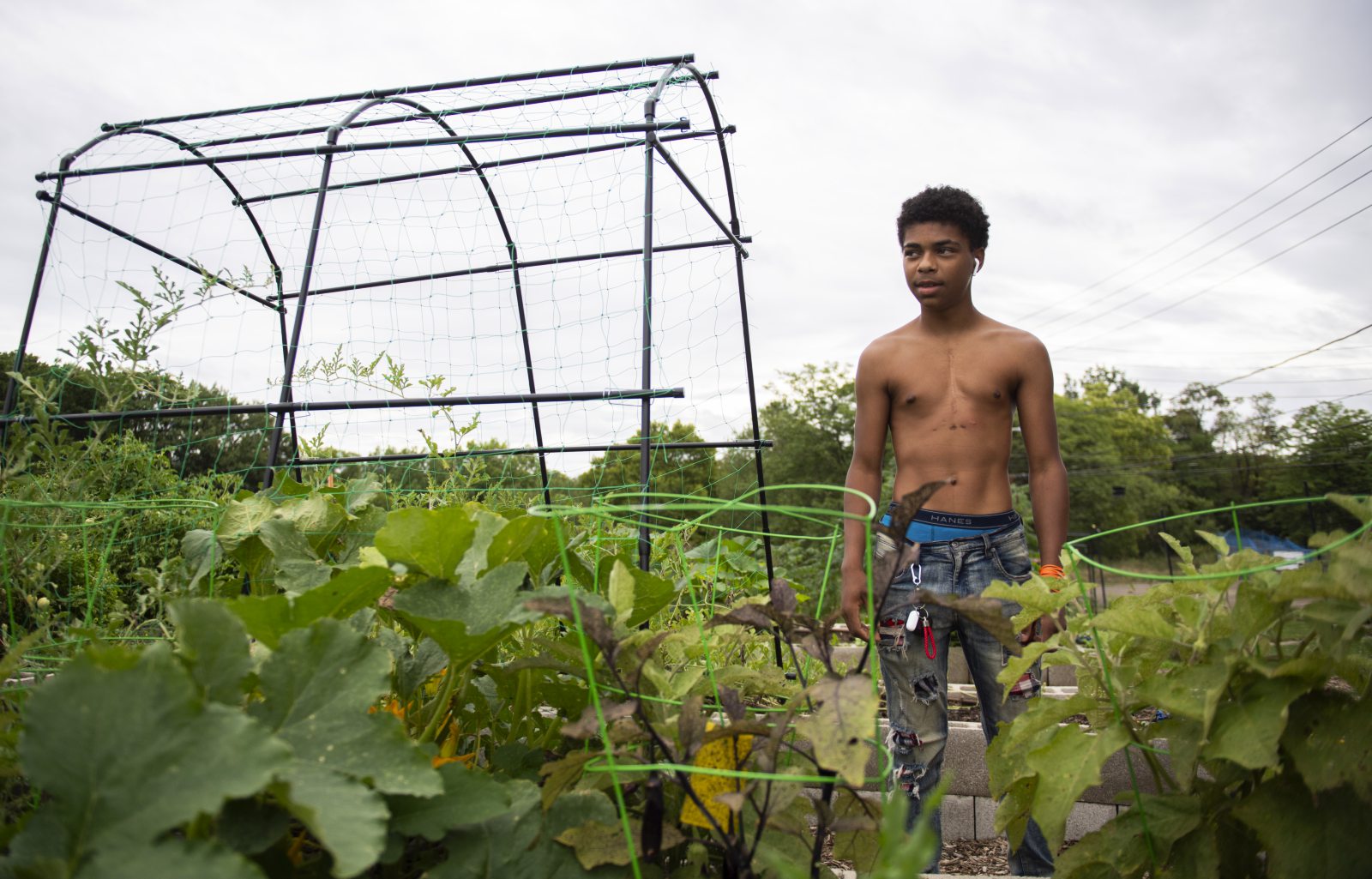
“Around here,” Shoenberger said, “a lot of people don’t get fresh produce or have a long walk or bus ride to it.”
Not only does the rejuvenated land help nourish a food-insecure community, it also provides an outlet for children and supports small businesses.
People perk up at the idea of receiving food grown at a farm within their own community, Shoenberger said
“When they hear it just grew over the hill, it just grew a mile and a half from here, folks are more interested in that,” he said. “They become connected.”
Zion Everett, 17, of Mt. Oliver, is one of the budding farmers. He came for a volunteer day and landed a gig as a summer intern.
Many local kids don’t have big yards or other places to enjoy nature. The farm, he said, provides much-needed green space.
“I wanted a job, and this ain’t bad, doing this work,” Zion said.
He plucked a deep purple eggplant that would be donated to Abiding Missions later that day.
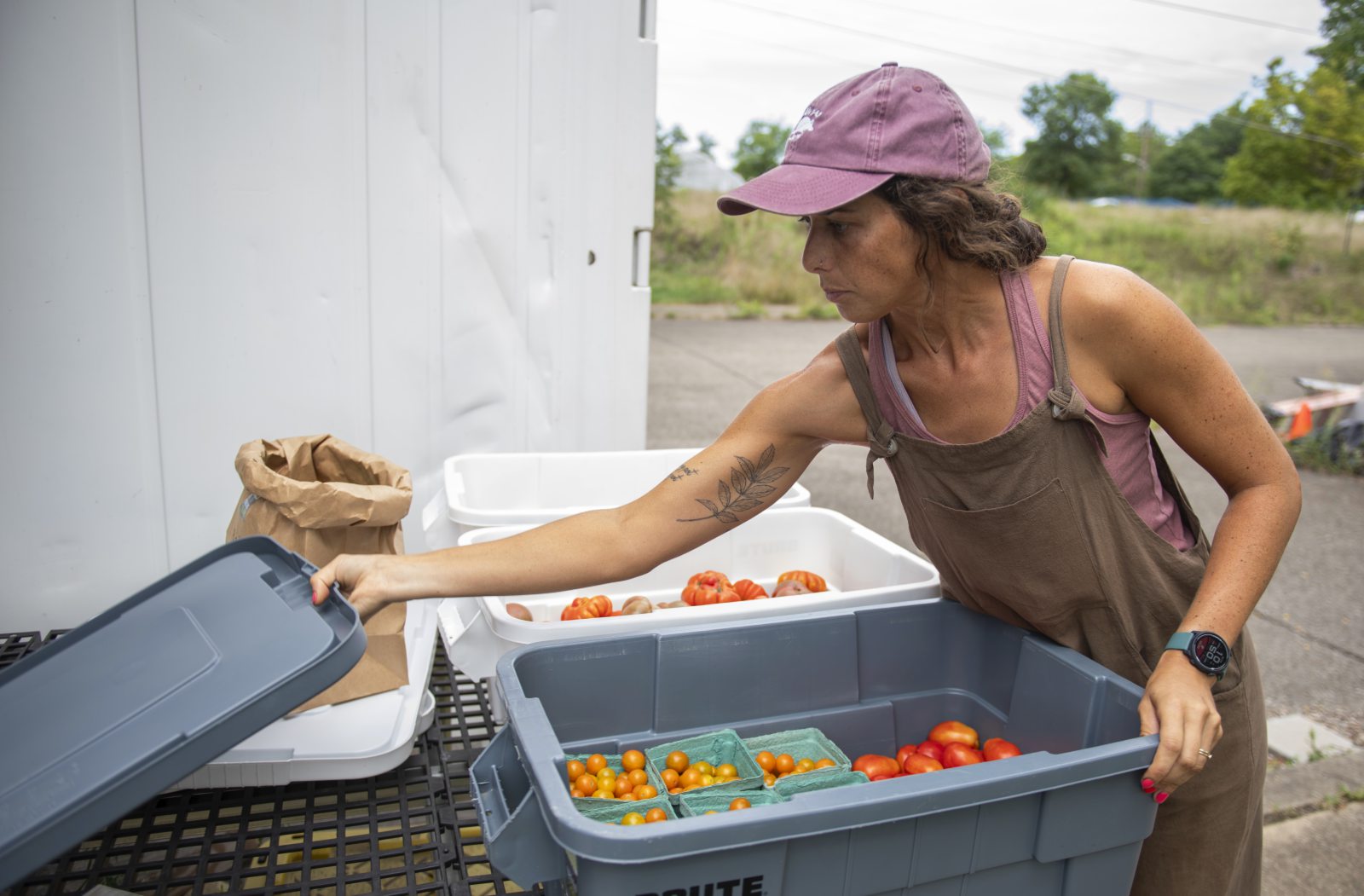
Tarentum is far smaller than Pittsburgh, but the appetite for urban farming to help the poor is just as big.
In this Alle-Kiski Valley community of just over 4,000 people, a small community garden launched in 2015 is today feeding low-income residents and others who struggle to find food in a borough that has no grocery store, said the Rev. Philip Beck, who runs the farm.
Tarentum officials and Beck have a 99-year lease to allow the community to farm a plot next to Tarentum Riverview Memorial Park for $1 a year.
Unlike many farms that use fences to keep out unwelcome animals or people, this one has no barriers. Pathways through the garden are wide enough to accommodate wheelchairs. Beck said he wants everyone to feel welcome to explore and take whatever food they need.
“If we put a fence around here, we would undo the whole purpose of this garden, which is to provide an open space for folks,” Beck said.
The tiny farm grows pears, blackberries, blueberries, carrots, collard greens, tomatoes, dill, chives, sweet peppers, squash, cucumbers and other crops.
There are several low-income and senior apartment buildings nearby, Beck said, and their residents often rely on the garden as their primary source of fresh produce. Other people come from neighboring communities.
On an average day, Beck said, the farm sometimes sees up to 20 people stop by to pick produce.
“We actually can’t keep up,” he said.
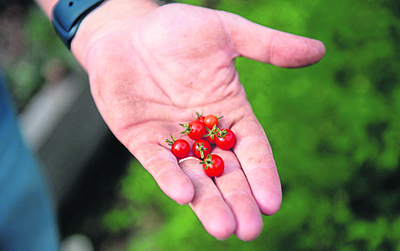
Dozens of volunteers help with watering crops, pulling weeds and showing visitors what is or isn’t ready to harvest, Beck said. Many volunteers have started their own backyard gardens since they began helping at the farm.
DJ Spencer, 60, of Brackenridge, has been volunteering at the Tarentum farm for about three years. She and her husband George — who is an organist at Beck’s First United Presbyterian Church — stop by to water plants once a week.
“It’s an important function for the area, I think, with the food insecurity that is prevalent everywhere,” Spencer said.
The Spencers help prepare the raised beds for planting in the spring, and they clean them out in the fall once the growing season ends.
Spencer said she sees people stopping by to grab much-needed food starting early in the morning.
Many have come to rely on the farm, she said. Some people who come by to pick produce will even take a moment to pull a few weeds.
“The thing I like best about it is it’s open to anybody,” Spencer said. “There’s no questions asked about income level or anything like that.”
Jody Shumaker, 62, of Natrona Heights, organizes volunteer schedules for watering the plants. She also helps with other elements of the farm’s upkeep, like planting seeds and laying mulch.
Shumaker, a retired Highlands School District teacher, said she has been taking on a little more responsibility at the garden every season over the five years she has been volunteering.
“I have such a huge passion for volunteering and keeping it local, too,” she said, adding that she sometimes takes her grandkids to assist.
It takes a lot of people — many of whom quietly help out behind the scenes — to keep the farm thriving. Many volunteers, Shumaker said, find a sense of peace as they care for the plants and give back to the community.
“It’s a very worthwhile project, and so many people benefit from it,” she said. “Many people come by and walk through the aisles and see what’s available.”
They use no pesticides at the farm, Beck said, and grow food in raised beds with high-quality soil.
Like many local farms, the Tarentum Friendship Garden serves as a gathering space. School programs sometimes stop by, Beck said, and a little free library and food pantry at the farm get many visitors.
“We’ve created a space of what was just grass into something that feeds people not only in body but potentially in soul, in spirit,” Beck said. “This place creates community and friendship.”
On a recent day, Beck inhaled the scent of freshly picked oregano as he strolled the wood-chip-covered paths, pausing to point out a black-and-yellow goldfinch pecking at seeds from an orange zinnia.
Beck said he finds peace in the farm — though noisy trucks barreling by often interrupt the buzzing bees and chirping birds. Beck enjoys working with volunteers and meeting people who stop by.
“It gives a sense of community,” Beck said.
The farm, Beck said, brings together a unique mix of people from diverse backgrounds.
“You could have a million dollars, or you could have zero dollars,” he said. “We don’t care about religious affiliation or who they’re going to vote for in the next election. Those cares disappear here.”
A variety of flowers — including sunflowers, Beck’s favorite — attract birds, bees and butterflies. Volunteers collect their seeds each year to replant again next spring.
“They bring joy, not food,” Beck said.
Maintaining an urban farm, though, isn’t all sunshine and sunflowers.
A hailstorm pelted plants earlier this year, damaging crops. Every year, Beck struggles to find enough volunteers to keep up with the necessary maintenance.
Beck said the farm can’t keep up with demand from the community. There’s been talk of expanding the farm, he said, but that would require more volunteers and more time — things that aren’t always easy to find.

Julia Burdelski is a Tribune-Review staff writer. You can contact Julia at jburdelski@triblive.com or via Twitter @JuliaBurdelski
Massoud Hossaini is a Tribune-Review photographer. You can contact Massoud via email at mhossaini@triblive.com